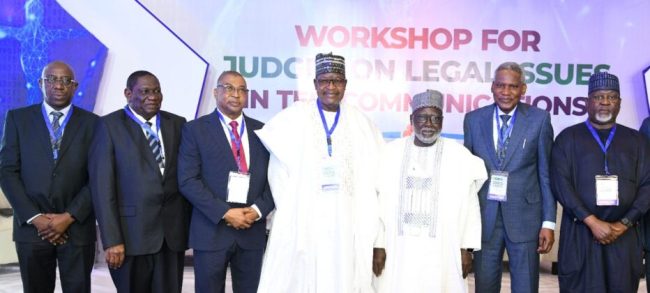The Chief Justice of Nigeria (CJN), Hon. Justice Olukayode Ariwoola has praised the Nigerian Communications Commission (NCC) for its regulatory strides and its dedicated efforts in promoting awareness and knowledge of Information Communications Technologies (ICT), among the judiciary.
The CJN who is the Chairman, Board of Governors of the NJI, spoke in an opening remark at the 2023 edition of NCC-hosted annual workshop for judges on telecommunications issues, which began in Kano on Monday (today).

Justice Ariwoola said that information technology and telecommunication services have surpassed the conventional method of court service delivery, as the use of the Internet is becoming a prominent feature of this era with innovative and interactive influences on the public, hence the crucial nature of the workshop.

Addressing the theme of the workshop, “The Adjudication Path in a Digital Era,” the CJN said it strikes a chord with the current realities that judicial officers face technologies that has fundamentally transformed how they communicate, access information and conduct legal proceedings.
The EVC/CEO of NCC expressed gratitude to the CJN and the top echelon of the judiciary for finding time to attend the workshop and promised the Commission’s resolve to deepen knowledge of the digital future on the judiciary as a very critical and indispensable arm of government.

Speaking on the importance of the workshop, Danbatta noted that the telecommunications sector has evolved since the NCA 2003 came into existence, hence the need to be responsive in readiness to keep pace with the dynamics of technologies that will come.
The EVC noted that the workshop afforded the Commission ample opportunity to engage the Judiciary on how to adopt digital technologies in advancing the course of justice.
He said, “The Communications Sector, through infrastructure deployment, has continually ensured that the digital economy agenda of the Federal Government is established on a solid foundation. It has also proven to be the catalyst for entrenching the activities of both the public and private sectors in the digital space, seamlessly.”
“However, we recognise that in any digital economy, the development of a complex web of commercial transactions and social interactions is inevitable. Thus, to instill societal confidence in the digital economy, at least two things are required: a safe and effective backbone infrastructure, as well as an efficient adjudicatory mechanism, which is easily accessible in the digital space,” he stated.
“This reality informs our steadfast partnership with the NJI to develop capacity for Judges in the current area as this would ensure that the Court, being the last hope of the common man, is firmly woven into the fabric of the digital economy,” he added.

